Backlink analysis tools are essential for evaluating and optimizing your website’s link profile, especially for those on a budget. These tools offer key features such as backlink tracking, domain authority analysis, and insights into competitor strategies, making them ideal for small businesses and individual marketers. By leveraging these tools, you can enhance your SEO performance and make informed decisions to improve your website’s visibility and traffic.

What are the best budget backlink analysis tools?
The best budget backlink analysis tools provide essential features for evaluating backlinks without breaking the bank. These tools typically offer a range of functionalities, including backlink tracking, domain authority analysis, and competitor insights, making them suitable for small businesses and individual marketers.
Ahrefs Backlink Checker
Ahrefs Backlink Checker is a popular tool that offers a free version allowing users to analyze the top 100 backlinks to any website. It provides insights into the domain rating, the number of referring domains, and the anchor text used, which can help identify strong backlink opportunities.
For more comprehensive features, a paid subscription is available, which includes access to the full backlink profile and advanced metrics. This tool is particularly useful for users looking to improve their SEO strategy through detailed backlink analysis.
SEMrush Backlink Audit
SEMrush Backlink Audit is another effective tool that helps users identify toxic backlinks and monitor their backlink profiles. The free version allows limited access, while the paid plans provide in-depth analysis, including the ability to assess the health of backlinks and discover new linking opportunities.
This tool is beneficial for maintaining a clean backlink profile, which is crucial for avoiding penalties from search engines. Users can also generate reports to share with their teams or clients, enhancing collaboration on SEO efforts.
Ubersuggest Backlink Analysis
Ubersuggest offers a user-friendly interface for backlink analysis, allowing users to see the backlinks of any domain and their respective metrics. The free version provides basic insights, while the paid version unlocks more detailed data, including the estimated traffic from each backlink.
This tool is ideal for those new to SEO, as it simplifies the process of understanding backlink profiles and identifying potential link-building opportunities. Users can also track their own backlinks over time to measure growth and effectiveness.
Majestic SEO
Majestic SEO is known for its extensive backlink database and unique metrics, such as Trust Flow and Citation Flow. The free version allows users to view limited data, while the paid plans provide access to comprehensive backlink analysis and historical data.
This tool is particularly useful for users looking to assess the quality of backlinks and understand the link-building landscape. Majestic’s focus on link metrics helps users make informed decisions about their SEO strategies.
Linkody
Linkody is a straightforward backlink monitoring tool that tracks backlinks and notifies users of any changes. It offers a free trial, and its paid plans are budget-friendly, making it accessible for small businesses and freelancers.
Linkody’s features include backlink tracking, competitor analysis, and reporting tools. This tool is especially useful for users who want to keep a close eye on their backlink profiles and ensure they are capitalizing on all available link-building opportunities.

How do backlink analysis tools improve SEO performance?
Backlink analysis tools enhance SEO performance by identifying valuable links that drive traffic and improve search rankings. They provide insights into link quality, competitor strategies, and overall backlink health, enabling informed decisions for optimizing a website’s link profile.
Identify high-quality backlinks
Identifying high-quality backlinks is crucial for boosting your website’s authority and search engine rankings. Backlink analysis tools evaluate links based on factors like domain authority, relevance, and trustworthiness. Focus on acquiring links from reputable sites within your niche to maximize their impact.
When assessing backlinks, consider metrics such as the PageRank of the linking page and the overall link profile diversity. Aim for a mix of dofollow and nofollow links to create a natural backlink profile. Regularly review your backlinks to ensure they remain high-quality over time.
Analyze competitor backlink profiles
Analyzing competitor backlink profiles helps you uncover new link-building opportunities and understand effective strategies in your industry. Backlink analysis tools allow you to view which sites link to your competitors, revealing potential targets for your own outreach efforts.
Look for patterns in your competitors’ backlinks, such as common sources or types of content that attract links. This information can guide your content creation and outreach strategies, helping you to replicate their success while differentiating your approach.
Monitor backlink health
Monitoring backlink health is essential for maintaining a strong SEO presence. Backlink analysis tools can alert you to toxic links that may harm your site’s reputation and rankings. Regular monitoring allows you to disavow harmful links and focus on building a healthier link profile.
Establish a routine for checking your backlinks, ideally every few months. Pay attention to changes in link status, such as removals or shifts in quality. Keeping your backlink profile clean and relevant is key to sustaining long-term SEO success.

What features should I look for in a backlink analysis tool?
When selecting a backlink analysis tool, focus on features that assess link quality, allow for competitor analysis, and provide comprehensive reporting metrics. These functionalities will help you understand your backlink profile and improve your SEO strategy effectively.
Link quality assessment
Link quality assessment is crucial for determining the value of backlinks. Look for tools that evaluate metrics such as Domain Authority (DA), Page Authority (PA), and Trust Flow. High-quality links typically come from reputable sites with relevant content, while low-quality links can harm your SEO efforts.
Consider tools that offer a scoring system to rank links based on their quality. For example, a tool might categorize links as high, medium, or low quality, allowing you to prioritize your outreach efforts effectively. Regularly reviewing your link profile can help identify harmful links that may need to be disavowed.
Competitor analysis
Competitor analysis features enable you to understand how your backlink profile compares to others in your industry. A good tool should allow you to view your competitors’ backlinks, identify their top-performing links, and analyze their link-building strategies. This insight can inform your own approach to acquiring high-quality backlinks.
Look for tools that provide a side-by-side comparison of your backlinks against your competitors. This can help you spot gaps in your strategy and discover potential link-building opportunities. Additionally, tracking competitors over time can reveal trends and shifts in their linking strategies.
Reporting and metrics
Effective reporting and metrics are essential for measuring the success of your backlink strategy. Choose a tool that offers customizable reports, allowing you to focus on the metrics that matter most to your goals, such as the number of new backlinks gained or the overall link growth rate.
Consider tools that provide visual representations of your data, such as graphs and charts, to make it easier to track progress over time. Regularly scheduled reports can help you stay informed about your backlink profile and make data-driven decisions to enhance your SEO performance.

How do pricing plans vary among backlink analysis tools?
Pricing plans for backlink analysis tools can differ significantly based on features, access levels, and whether they are free or paid. Users should evaluate their needs against the available options to find a suitable tool that fits their budget and requirements.
Free vs. paid plans
Free plans often provide limited access to features, such as a restricted number of backlinks analyzed or fewer data points. These options can be useful for beginners or small projects but may lack the depth needed for comprehensive analysis.
Paid plans generally offer a wider range of features, including advanced metrics, historical data, and more extensive reporting capabilities. Users can expect to pay anywhere from $30 to several hundred dollars per month depending on the tool and the level of service.
Monthly subscription costs
Monthly subscription costs for backlink analysis tools can vary widely. Basic plans may start around $30 to $50 per month, while more advanced options can range from $100 to $500 or more, depending on the features included.
When selecting a plan, consider the number of users, the volume of backlinks you need to analyze, and any additional features such as API access or white-label reporting. Many tools offer discounts for annual subscriptions, which can provide better value.
Feature limitations in budget options
Budget options often come with feature limitations that can impact their effectiveness. For example, they may restrict the number of backlinks you can analyze per month or limit access to certain types of data, such as competitor insights or keyword tracking.
It’s essential to assess whether these limitations will hinder your analysis. If you require comprehensive data for multiple projects, investing in a higher-tier plan may be necessary to unlock the full potential of the tool.

What are the key differences between Ahrefs and SEMrush?
Ahrefs and SEMrush are two leading backlink analysis tools, each with unique strengths. Ahrefs excels in its extensive backlink database, while SEMrush offers a more comprehensive suite of SEO features.
Backlink database size
Ahrefs boasts one of the largest backlink databases available, often cited for having hundreds of billions of backlinks. This extensive database allows users to uncover a wide range of link-building opportunities and analyze competitors’ profiles effectively.
SEMrush, while also robust, has a smaller backlink index compared to Ahrefs. However, it still provides valuable insights and can be sufficient for many users, especially those focused on specific niches or regions.
User interface and experience
Ahrefs features a clean and intuitive interface, making it easy for users to navigate through its various tools. The dashboard is straightforward, allowing users to quickly access backlink data and other SEO metrics without feeling overwhelmed.
SEMrush offers a more complex interface with a broader array of features. While this can be beneficial for advanced users, newcomers may find it slightly challenging to locate specific tools or data points. However, SEMrush does provide helpful tutorials and resources to assist users in maximizing its capabilities.
Pricing structures
Ahrefs typically operates on a subscription model with several tiers, starting at around $99 per month for basic features. Higher tiers unlock more extensive data and additional tools, catering to different user needs.
SEMrush also follows a subscription model, with plans starting at approximately $119.95 per month. It often includes more features beyond backlink analysis, such as keyword research and site audits, making it a versatile option for comprehensive SEO strategies.

How can I effectively use backlink analysis tools?
To effectively use backlink analysis tools, start by identifying your goals, such as improving SEO or analyzing competitors. These tools help you evaluate the quality and quantity of backlinks, allowing you to make informed decisions about your link-building strategy.
Understanding backlink profiles
A backlink profile is a collection of all the backlinks pointing to a website. Analyzing this profile helps you understand the strengths and weaknesses of your site’s link strategy. Look for metrics like domain authority, the diversity of linking domains, and the relevance of the links to your niche.
When assessing a backlink profile, consider the ratio of dofollow to nofollow links. A healthy profile typically has a mix, with dofollow links carrying more weight for SEO. Tools can often provide visual representations of these profiles, making it easier to spot trends and areas for improvement.
Key features to look for
When selecting a backlink analysis tool, prioritize features such as link quality assessment, competitor analysis, and reporting capabilities. Tools should provide insights into the anchor text used, the context of the links, and the historical performance of backlinks.
Consider tools that offer integration with other SEO platforms, as this can streamline your workflow. Additionally, features like alerts for new or lost backlinks can help you stay proactive in managing your link profile.
Budget-friendly options
There are several budget-friendly backlink analysis tools available that provide essential features without breaking the bank. Tools like Ahrefs, SEMrush, and Moz offer free trials or lower-tier plans that can be suitable for small businesses or freelancers.
Look for tools that offer a pay-as-you-go model or monthly subscriptions, which can be more manageable for those on a tight budget. Free tools like Ubersuggest or Google Search Console can also provide valuable insights, though they may lack some advanced features.
Comparing popular tools
When comparing popular backlink analysis tools, consider factors such as pricing, user interface, and the depth of data provided. For example, Ahrefs is known for its extensive database and user-friendly interface, while SEMrush offers a comprehensive suite of SEO tools.
Creating a simple comparison table can help visualize the differences. For instance, you might compare features like backlink database size, reporting options, and customer support. This will aid in selecting the right tool based on your specific needs and budget.
